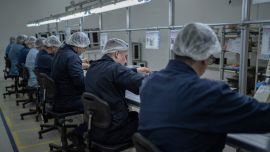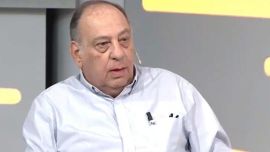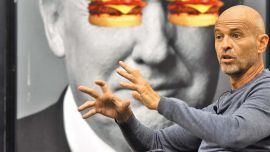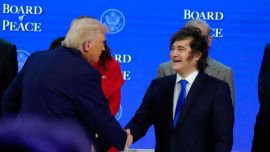After the worst economic collapse in modern history, Venezuela’s economy may finally have hit bottom.
The hyperinflation of years past is still, well, hyper, but it has moderated dramatically from levels that exceeded hundreds of thousands of percentage points a year. And President Nicolás Maduro is confident that output, which has contracted by about 80 percent since 2012, will expand slightly in 2021, a forecast shared by some private analysts.
The turnaround is mostly due to a combination of reforms straight out of economic orthodoxy: eliminating price controls, reducing subsidies on essentials such gasoline and removing many restrictions on foreign exchange. Today, almost everything in the country is priced in dollars, not bolívares. Even a sign in the biggest slum in Caracas, the capital city, advertises a haircut for US$2.
Behind it all is Delcy Rodríguez, the vice-president who also serves as finance minister. Together with Patricio Rivera, a former Ecuadorean economy minister who’s been advising her since 2019, she has borrowed from the capitalist playbook to revive an economy damaged by the US sanctions that effectively bar Venezuela from exporting oil.
The result is a policy mix that bears little resemblance to the neo-Marxist “Socialism of the 21st century” that Venezuela pursued under the late Hugo Chávez, Maduro’s predecessor. That system created a byzantine set of currency controls and preferential rates, largely to the benefit of those with government ties, not to mention an enormous black market for dollars. The bolívar lost 99 percent of its value and inflation spiralled out of control.
“You cannot say that at the time that was socialism, no,” Rodríguez said in an interview at a poor neighbourhood in southwest Caracas. “That was going directly against the people, against the purchasing power of the people.”
Combined with severe limits on lending and on money-printing by the Central Bank, the ad hoc dollarisation of the economy has kept prices rising at a much slower rate. Annual inflation is down to 2,266 percent a year from more than 300,000 percent in 2019; on a monthly basis, price gains slowed even further to about 20 percent in May.
One challenge is keeping enough US currency in circulation. Since last year, the Central Bank has been sending millions of dollars – and, to a lesser extent, euros – in cash to local lenders to exchange with clients. That helped stop the bolívar from plummeting in the parallel foreign-exchange market that most Venezuelans use.
The reforms have also helped spur domestic demand, according to a Credit Suisse Group AG note in April. The Swiss bank forecast as much as four-percent growth in gross domestic product, barring any major Covid-19 lockdowns. Caracas-based consultancy firm Econométrica sees gross GDP expanding as much as eight percent, Director Henkel García said.
The nation rarely publishes its economic data, and when it does it usually comes with months of delay, meaning most economists are usually left in the dark when making their own forecasting for economic growth or inflation.
In another tilt away from socialism, private companies have displaced the state as the dominant force in many parts of the economy. They accounted for 92 percent of Venezuela's raw materials and food imports in 2020, compared to 25 percent the previous year, according to government figures seen by Bloomberg News. That has allowed the Maduro government to close part of its huge fiscal gap.
Small relief
To be sure, the green shoots are only a small relief. The country is still reeling from two decades of economic mismanagement and four years of crippling sanctions. Most of the population doesn’t have access to dollars.
“The reality is that almost everyone in the country is going through poverty and extreme hardship,” Sergi Lanau, the deputy chief economist at the Institute of International Finance, said by telephone from Washington.
His forecast for Venezuelan growth is a more modest 0.3 percent this year, increasing to 1.3 percent in 2022. While some growth after so many years of misery is positive, there’s a “complete disconnect” between what ordinary people are living day-to-day and assurances from the government that the economy is recovering, he said.
Plus, attracting the capital needed to rebuild Venezuela’s critical oil industry is still next to impossible. Not only is the country locked out of dollar-based financial markets because of the sanctions, Lanau also cited the current state of political uncertainty and need for International Monetary Fund involvement.
Other economists are even more pessimistic: Ecoanalítica’s Asdrubal Oliveros sees GDP contracting by 4.4 percent this year.
Oil production, the nation’s largest source of revenue, remains a huge swing factor.
In 2019, the Donald Trump administration placed a de facto ban on US imports of Venezuelan oil. Output plunged to just 310,000 barrels a day in August 2020, the lowest level since the 1940s, but has since rebounded to more than 500,000.
Following months of severe fuel shortages, the state began selling fuel at the equivalent of 50 US cents a litre at gas stations nationwide last year. It was a historic move after decades in which Venezuelans filled their tanks essentially for free. Now, the new income may allow national state-own producer Petroleos de Venezuela SA, or PDVSA, to recover millions lost in subsidies.
Little in Venezuela resembles the days when production regularly topped 2.5 million barrels a day, billions of dollars poured into public coffers and Chávez, in the name of a Bolivarian Revolution, nationalised hundreds of companies. Now, however reluctantly, the state has no choice but to lean on the capitalists it once demonised if it wants growth, jobs and rising wages.
“Today the private sector of Venezuela is becoming less dependent on oil income,” Rodriguez, the vice-president, said. “It’s becoming a sector that invests, produces, and finds in Venezuela a space where it can develop its potential.”
Not exactly a revolutionary rallying cry.
related news
by Patricia Laya, Alex Vasquez & Erik Schatzker, Bloomberg






















Comments